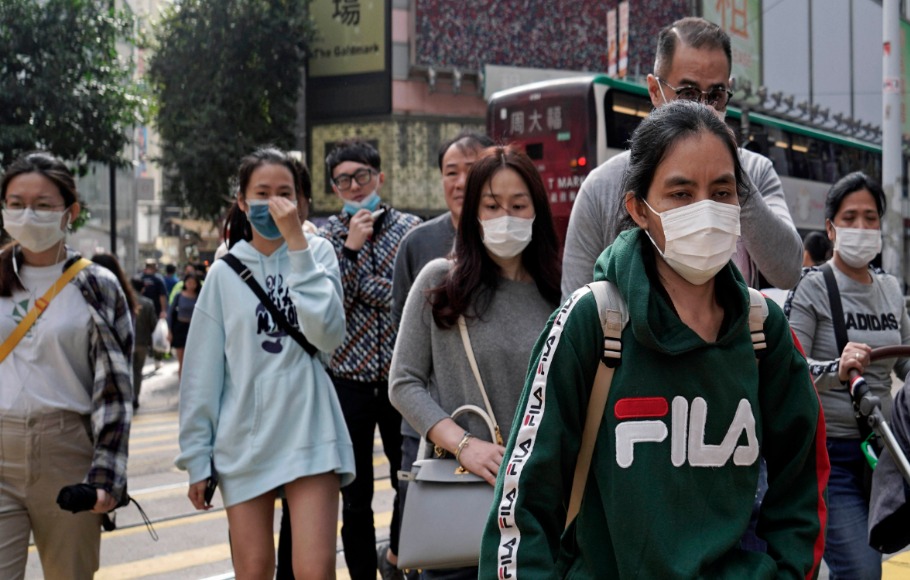
Coronavirus claims 213 lives in China, WHO declares international emergency
The death toll in China’s novel coronavirus outbreak has climbed to 213 with the number of confirmed cases totalling to 9,692 as of Friday (January 31). In view of the high casualties, the World Health Organisation (WHO) has declared an international emergency, a rarely used designation that could lead to improved international co-ordination in tackling the disease.

The death toll in China’s novel coronavirus outbreak has climbed to 213 with the number of confirmed cases totalling to 9,692 as of Friday (January 31). In view of the high casualties, the World Health Organisation (WHO) has declared an international emergency, a rarely used designation that could lead to improved international co-ordination in tackling the disease.
Hubei province, the epicentre of the outbreak has so far reported 5,806 confirmed cases, official media reported. A total of 213 people have died of the disease as of Thursday, state-run Xinhua news agency reported.
About 20 countries, including India, have reported confirmed cases of the virus in travellers coming from China. China said it has full confidence and capability to win the fight against the epidemic.
The WHO has declared the novel coronavirus outbreak a global health emergency. “Our greatest concern is the potential for the virus to spread to countries with weaker health systems,” WHO chief Tedros Adhanom Ghebreyesus said as he announced the virus as a Public Health Emergency of International Concern (PHEIC).
Also read: Coronavirus outbreak: China falls short of N95 masks, seeks India’s help
Reacting to the announcement, Chinese foreign ministry spokesperson Hua Chunying in a press statement said, “Since the outbreak of the novel coronavirus epidemic, the Chinese government has been taking the most comprehensive and rigorous prevention and control measures with a high sense of responsibility for people’s health.” Many of these measures go well beyond the requirements of the International Health Regulations, she said.
“We have full confidence and capability to win this fight against the epidemic,” said the spokesperson. She said that at the same time, the Chinese side informed relevant sides and shared the genome sequence of the coronavirus in a timely manner with openness, transparency and a responsible attitude.
“WHO experts recently conducted a field trip to Wuhan. Director-General Tedros Adhanom Ghebreyesus also visited China and discussed containment and mitigation of the 2019-nCoV with the Chinese side,” she said.
The WHO said there have also been 82 confirmed cases in 18 other countries, including cases of onward transmission in Germany, Japan, the United States and Vietnam. The WHO has called a public health emergency of international concern only five times since the relevant legislation took effect in 2007 — for swine flu, polio, Zika and twice for Ebola outbreaks in Africa.
India, Britain Portugal get citizens home, US sounds alert
Even as many countries have urged their citizens not to visit China and some have banned entry for travellers from Wuhan, several countries are taking steps to evacuate their citizens from the infected city.
India, which confirmed its first case of coronavirus on Thursday, will soon send an Air India aircraft with a special crew including doctors to Wuhan to bring back its stranded nationals.
Acting on WHO’s alert, the United States told its citizens on Thursday night not to travel to China.
In an updated travel advisory, the department said any Americans in China now “should consider departing using commercial means.” It recalled that last week it had ordered the departure of all non-emergency US personnel and their family members from Wuhan. “The US government has limited ability to provide emergency services to US citizens in Hubei province,” the advisory said.
Britain has received clearance to evacuate around 200 of its citizens from Wuhan, the government said on Thursday. Foreign Secretary Dominic Raab said the charter flight would leave early on Friday morning local time, after receiving the necessary clearance from Beijing. “We are pleased to have confirmation from the Chinese authorities that the evacuation flight from Wuhan airport to the UK can depart at 0500 local time on Friday, 31 January,” he said. “The safety and security of British nationals is our top priority. Our embassy in Beijing and consular teams remain in close contact with British nationals in the region to ensure they have the latest information they need.”
Russia has also decided to close its border with China to prevent the spread of the virus.
Also read: Scare on the high sea: Corona fear strands cruise ship with 6,000 off Italy
Meanwhile, an A380 jet left Portugal on Thursday to repatriate more than 300 EU citizens from Wuhan, epicentre of the coronavirus outbreak, Portuguese broadcaster Sic Noticias reported. Lisbon’s foreign ministry said the plane, operated by Portuguese charter airline Hi Fly, was bound for China in a discreet operation to bring out Europeans based in the city in central Hubei province with Beijing’s cooperation.
“We estimate around 350 passengers to come back. They are all European and many nationalities, including Portuguese,” the flights Greek captain Antonios Efthymiou told Sic Noticias before the flight left Beja airport some 170 kilometres (105 miles) south of Lisbon.
Some still unprepared
Hailing the “speed of response so far” by China and other affected by the novel coronavirus, the Global Preparedness Monitoring Board (GPMB), an independent body created by WHO and the World Bank, said many countries, however, are unprepared to face the deadly virus spreading in China and beyond
“The Board however is concerned that many countries remain unprepared and urges leaders in all countries to take immediate action to ensure that they have the necessary capacities in place,” it said in a statement. “All countries and local governments, including those that have not yet been affected, must urgently dedicate resources to building their essential preparedness capacities,” it said. They must be positioned to “prevent, detect, inform about and respond to the outbreak,” it said.
(With inputs from agencies)

